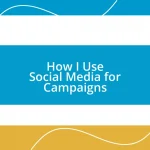Key takeaways:
- Active listening and vulnerability are crucial for building strong relationships, as they foster deep connections and enhance understanding.
- Trust is foundational in relationships, supported by reliability, honesty, support, forgiveness, and mutual understanding.
- Nurturing relationships through quality time and shared experiences, alongside effective conflict resolution and continuous growth, strengthens bonds over time.
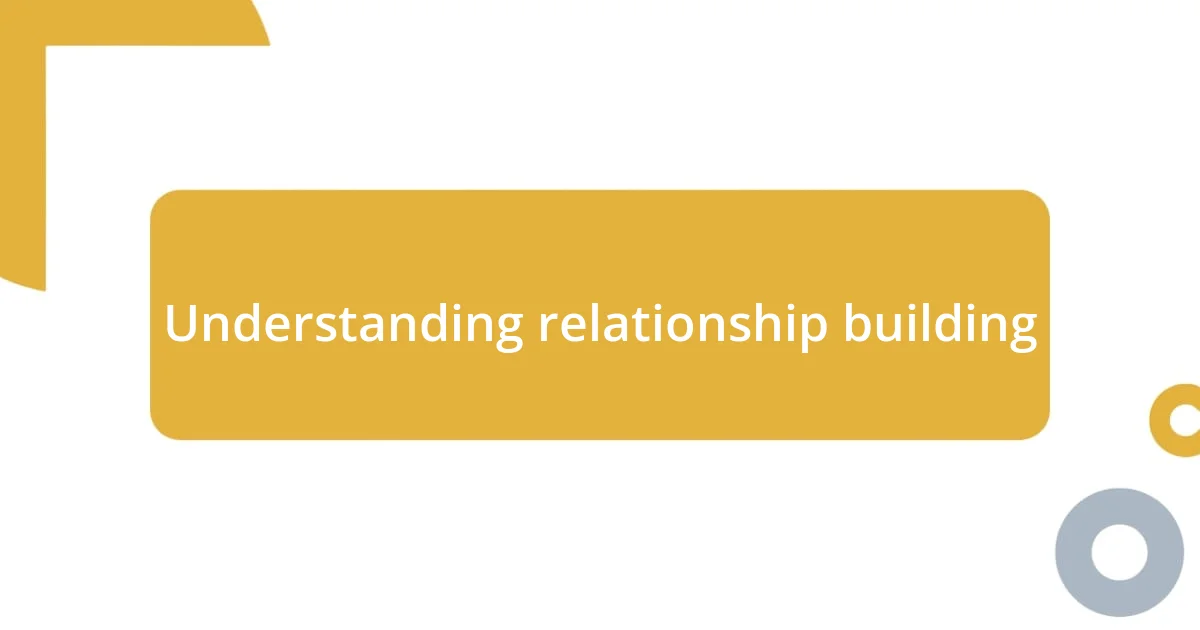
Understanding relationship building
Building strong relationships starts with understanding what each individual brings to the table. Reflecting on my own journey, I recall a time when I truly listened to a friend’s struggles rather than waiting for my turn to speak. That moment deepened our bond tremendously, highlighting the importance of active listening in relationship building.
Have you ever considered how vulnerability can transform a connection? I remember sharing my fears with a colleague during a difficult project. That simple act not only brought us closer but also fostered an environment where we could both express ourselves freely, proving that openness often leads to stronger ties.
Understanding relationship building also means recognizing the value of consistency. I’ve seen friendships flourish when both parties make an effort to check in regularly. Think about the small gestures—like sending a quick text or sharing a motivational quote—that can keep the connection alive. Aren’t those little things what really make relationships vibrant?
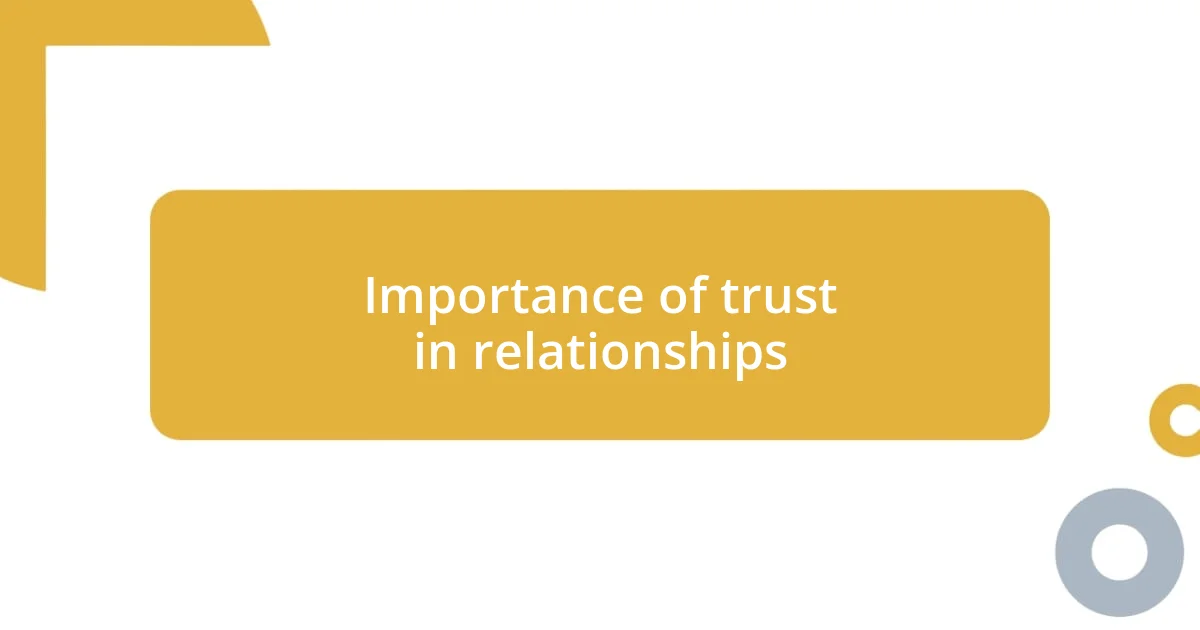
Importance of trust in relationships
Trust forms the bedrock of any strong relationship. In my experience, when trust is present, communication flows naturally, and I find it easier to be vulnerable. I recall an instance with a close friend who faced a personal crisis; by trusting each other, we were able to discuss our fears and insecurities openly, which not only strengthened our bond but also created a safe space for both of us.
Here are some key aspects of trust in relationships:
- Reliability: Consistently being there for each other fosters dependability.
- Honesty: Being truthful, even when it’s difficult, builds a solid foundation.
- Support: Showing that you have each other’s backs, especially in tough times, reinforces trust.
- Understanding: When you genuinely seek to understand each other’s feelings and perspectives, it deepens the connection.
- Forgiveness: The ability to forgive mistakes is crucial; it allows relationships to grow despite setbacks.
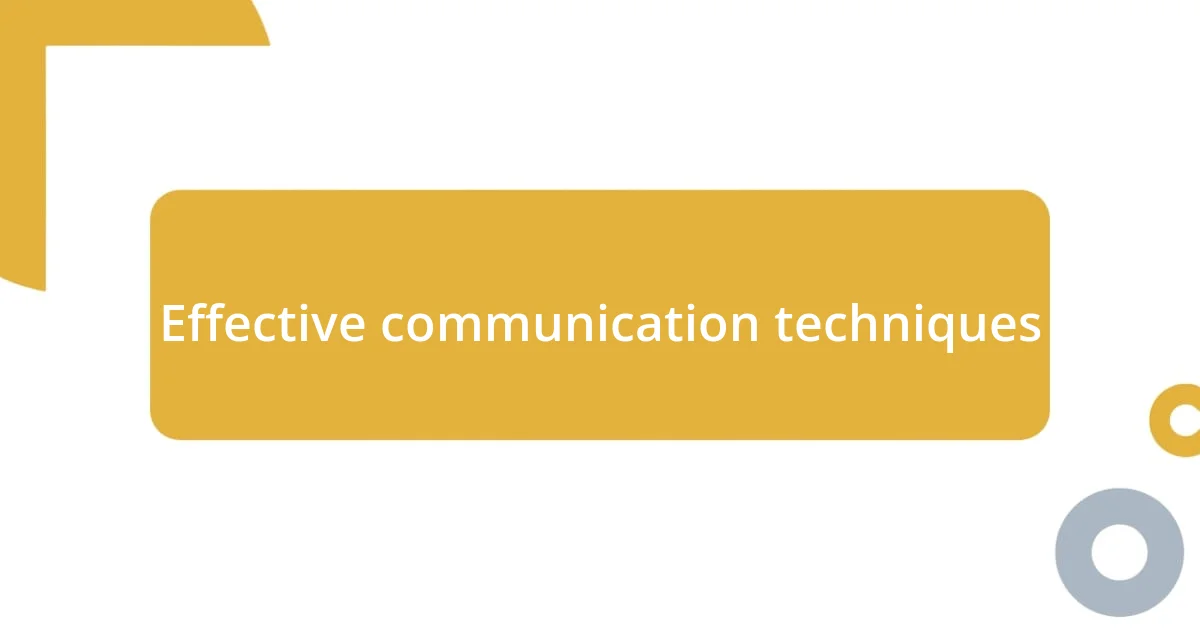
Effective communication techniques
Effective communication is at the heart of every strong relationship. I remember a time when I took a chance and asked a friend how they really felt about a misunderstanding we had. That straightforward question led to a heartfelt discussion, uncovering not just the issue at hand but also deepening our understanding of one another. Have you ever avoided the tough conversations? I know I have, but I’ve learned that embracing those moments is what ultimately strengthens bonds.
One technique that has proven invaluable is practicing empathy during conversations. I try to place myself in the other person’s shoes – their experiences, emotions, and perspectives. It’s a simple technique, yet the impact can be profound, as it shifts the conversation from mere words to genuine connection. When I do this, I find that the dialogue becomes more meaningful, and it often encourages the other person to reciprocate. Have you felt that shift when someone truly listens?
Another effective technique is the use of open-ended questions. These are questions that encourage elaboration and discussion rather than simple “yes” or “no” answers. I often start my conversations this way, and I’ve noticed a remarkable difference in how people respond. Instead of skimming the surface, we dive deeper into thoughts and feelings. Incorporating these techniques has transformed my relationships—allowing me to express myself while making others feel valued and understood.
| Communication Technique | Benefits |
|---|---|
| Active Listening | Fosters trust and shows genuine interest. |
| Empathy | Encourages deeper understanding and connection. |
| Open-ended Questions | Promotes elaborate discussions and engagement. |
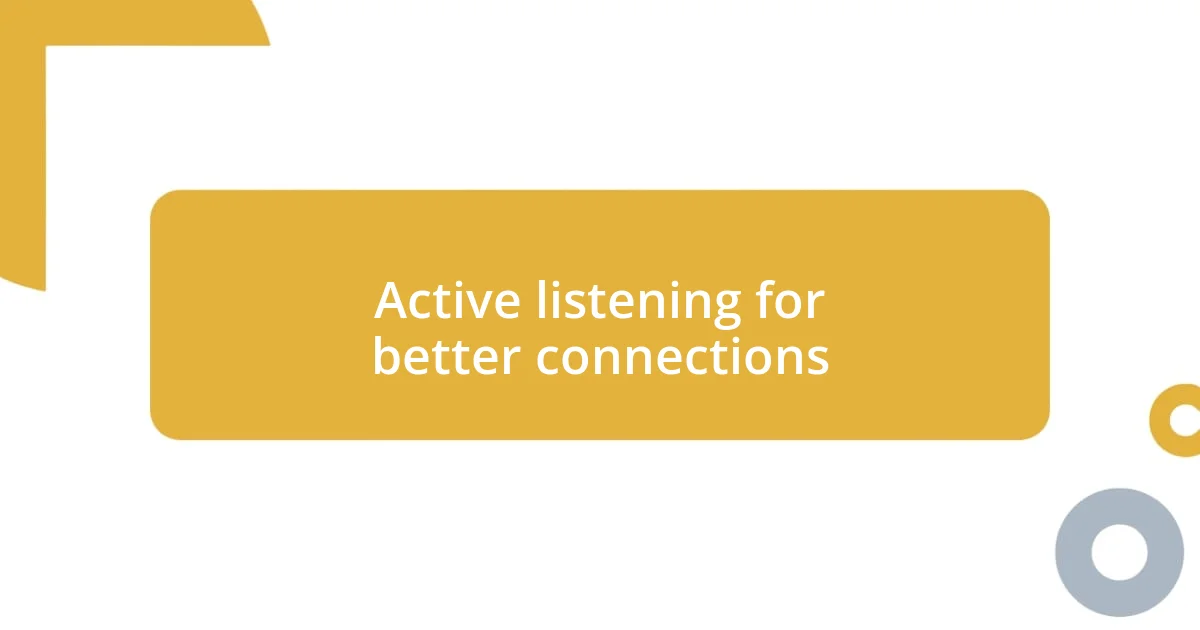
Active listening for better connections
Active listening is a powerful tool for building stronger connections. I remember a time when I sat down with a colleague who was visibly frustrated about a work project. Instead of jumping in with my own opinions, I focused on truly hearing his concerns, nodding and maintaining eye contact. By the end of our conversation, he expressed relief and gratitude, saying it felt good to be heard. Doesn’t it make you realize how validating it is to share your thoughts with someone who genuinely pays attention?
When I engage in active listening, I find that my responses often reflect the speaker’s feelings and thoughts. For instance, I once listened to a family member share stories about their day—complete with highs and lows. Instead of simply agreeing or offering advice, I responded with, “It sounds like you felt really overwhelmed, yet also excited at times.” This acknowledgment deepened our discussion and encouraged her to open up even more. Have you experienced that moment when someone captures your feelings perfectly?
I also believe that active listening means being present. I recall a conversation where I noticed my mind wandering to my to-do list. Once I realized this, I brought my focus back to the speaker, leaning in and putting away my phone. It made all the difference. I felt not just more connected, but she even remarked on how nice it was to have my undivided attention. Isn’t it fascinating how simply being present can transform our conversations?
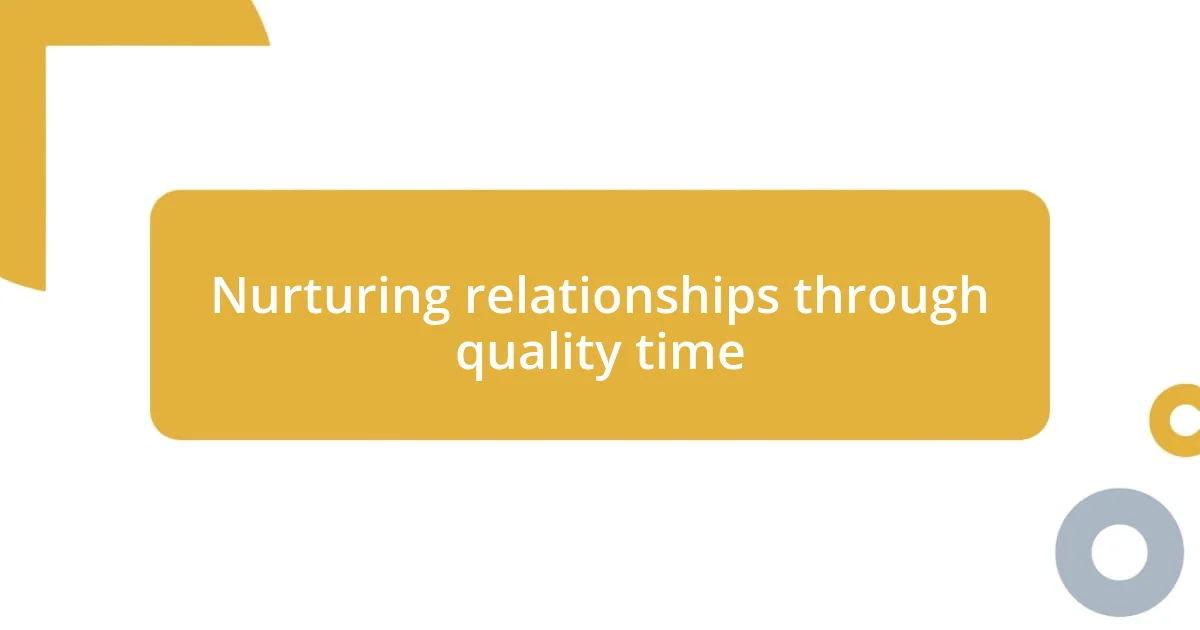
Nurturing relationships through quality time
Nurturing relationships through quality time is something I’ve found to be incredibly fulfilling. One Saturday afternoon, I decided to set aside my usual weekend tasks and go for a hike with a close friend instead. The fresh air and stunning views provided the perfect backdrop for us to chat without distractions. Remember a time when you felt like you truly connected with someone? That day, I realized that stepping away from the chaos of daily life can deepen a bond in ways we often overlook.
I’ve also discovered the power of shared experiences in nurturing relationships. I once organized a simple cooking night with my siblings, where we tried our hand at making homemade pasta. Not only did we create a delicious meal, but the laughter and teamwork reminded us of our childhood days. When was the last time you did something fun with loved ones? Those moments of joy are what truly weave the fabric of our relationships tighter.
Quality time doesn’t always need to be elaborate or planned. I remember a quiet evening spent with my partner, just talking about our dreams and fears over a cup of tea. Even this seemingly mundane moment turned into a significant conversation, strengthening our understanding of each other. It’s interesting how sometimes the simplest moments can foster the deepest connections. Have you had an experience like that, where time spent together turned into something meaningful?
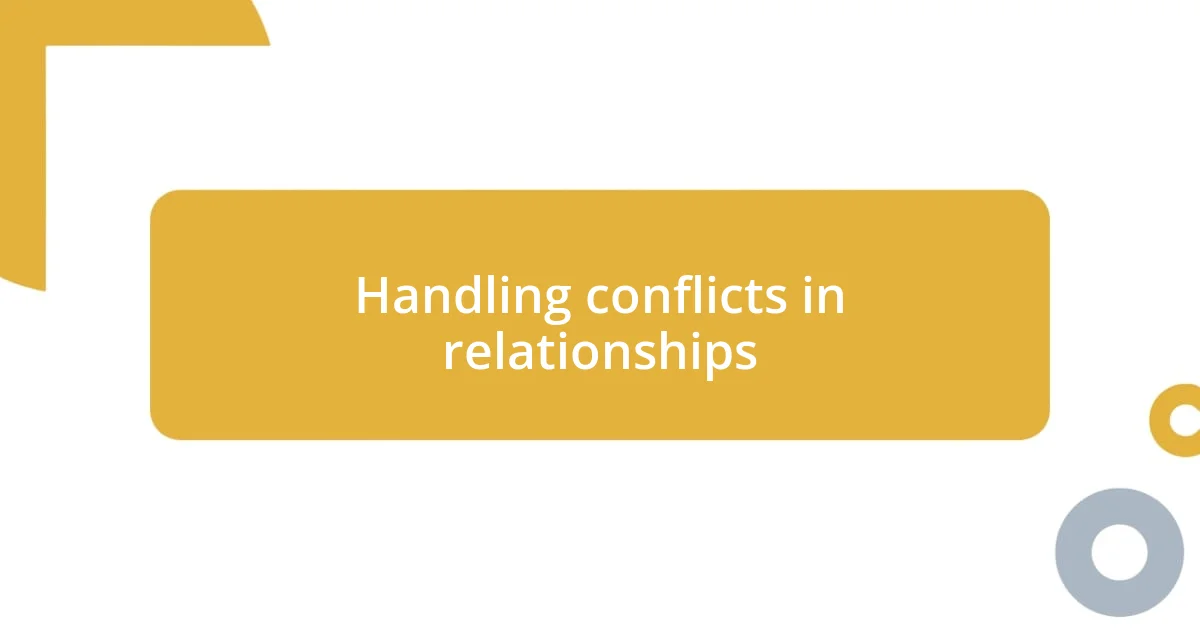
Handling conflicts in relationships
Conflicts are inevitable in any relationship, but I’ve learned that the way we handle them can significantly impact our bonds. I recall a heated discussion with a close friend about differing perspectives on a crucial project. Instead of letting tempers flare, I chose to calmly express my feelings while also inviting her to share hers. This approach not only diffused the situation but led us to a collaborative solution, reminding me of the strength found in mutual respect. Have you ever turned a disagreement into a learning opportunity?
When navigating conflicts, I believe that taking a step back can work wonders. There was a time when I felt overwhelmed by an argument with a family member, and rather than diving into more accusations, I opted for a break. I took a walk to clear my head and gain perspective. This moment of reflection helped me return with a fresh mindset, enabling a more constructive conversation. Isn’t it amazing how a little distance can grant clarity?
Apologizing sincerely is another key element I’ve found vital in conflict resolution. I recently had a miscommunication with a coworker, where my words unintentionally hurt her feelings. Recognizing my part in it, I approached her to apologize and explain my intent. Her relief was palpable, and our relationship not only repaired but grew stronger. Have you experienced the transformative power of a heartfelt apology?
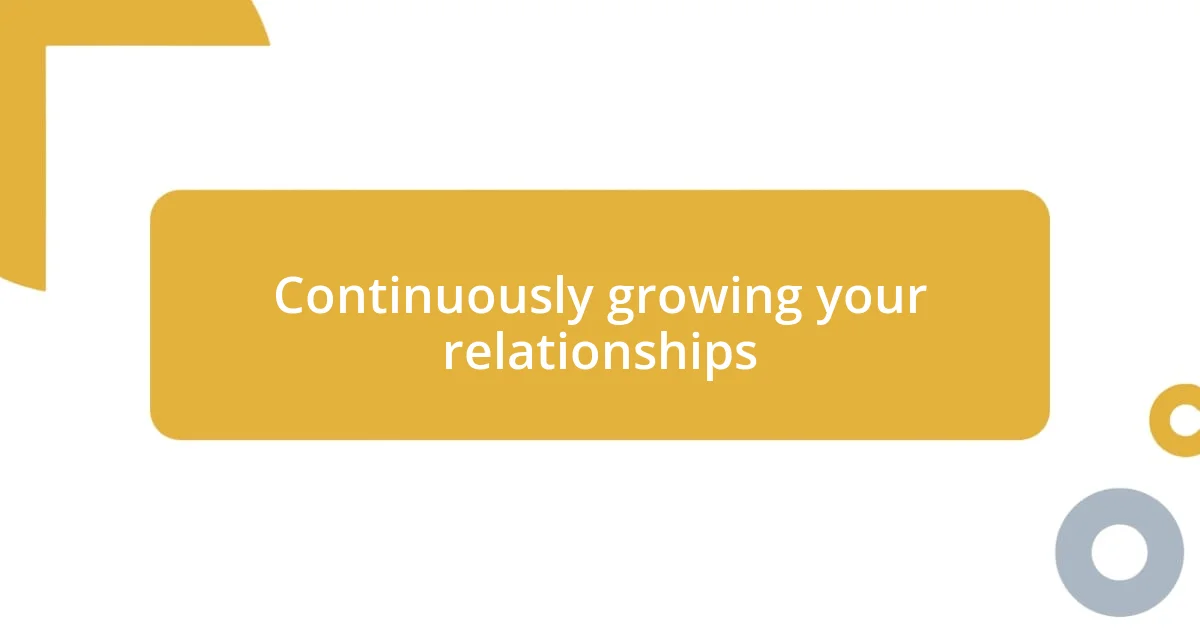
Continuously growing your relationships
Continuously investing in relationships requires a commitment to growth and understanding. I remember a time when a good friend and I decided to check in with each other more frequently, setting aside just 10 minutes a week to share our lives. Those brief talks transformed into deeper discussions about our aspirations and challenges, proving that even small gestures can lay the groundwork for something substantial. Have you explored ways to maintain that connection with someone special?
Another aspect I’ve found essential is the willingness to adapt as relationships change. I once had a close friendship that began to shift when we entered different life stages—she was starting a family while I was focusing on my career. Instead of drifting apart, we made an effort to celebrate each other’s milestones, often sharing how those experiences shaped us. I often wonder, how do you embrace the changes in your relationships without losing that initial spark?
Lastly, expressing gratitude can be a powerful tool in continuously nurturing relationships. I recall writing my partner a heartfelt note, listing the little things I appreciated about him. The smile on his face when he read it was contagious, solidifying our bond further. It’s those simple, unexpected gestures that remind us how important it is to show we care. Have you taken a moment lately to acknowledge someone in your life?










